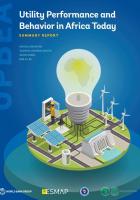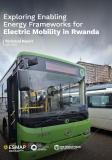Publications
Electric utilities are central to the energy development agenda of Sub-Saharan Africa, as expressed in Sustainable Development Goal 7 (SDG 7), which commits the international community to ensure access to affordable, reliable, sustainable, and modern energy for all by 2030. Over the previous two decades, utilities in Sub-Saharan Africa have made impressive strides in expanding the delivery of modern electricity services to households and businesses.
The continent’s electricity access rate increased from 28 percent in 2000 to 48 percent in 2018, and generation capacity grew from 63 gigawatts in 2000 to 106 gigawatts in 2017. However, COVID-19 threatens to upend these gains, rendering the challenge of reaching SDG 7 even more urgent and, at the same time, even more difficult to achieve. In response, utilities will have to step up to the task of providing service to millions who now live without electricity, ensure reliable electricity for health facilities and schools, become credible off-takers for private developers of renewable energy, and promote regional energy trade.
Balabanyan, Ani; Semikolenova, Yadviga; Singh, Arun; Lee, Min A. 2021. Utility Performance and Behavior in Africa Today. World Bank, Washington, DC. © World Bank. https://openknowledge.worldbank.org/handle/10986/36178 License: CC BY 3.0 IGO.




